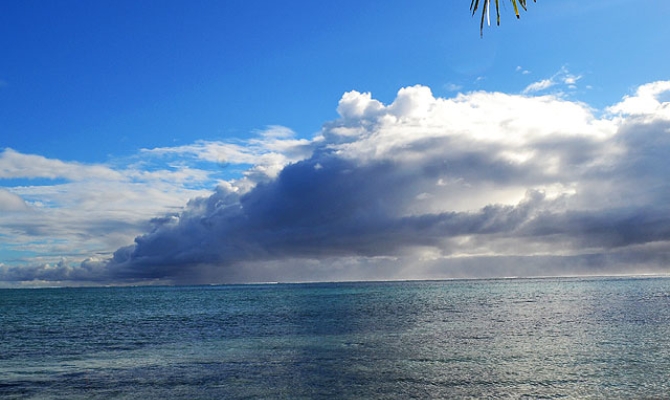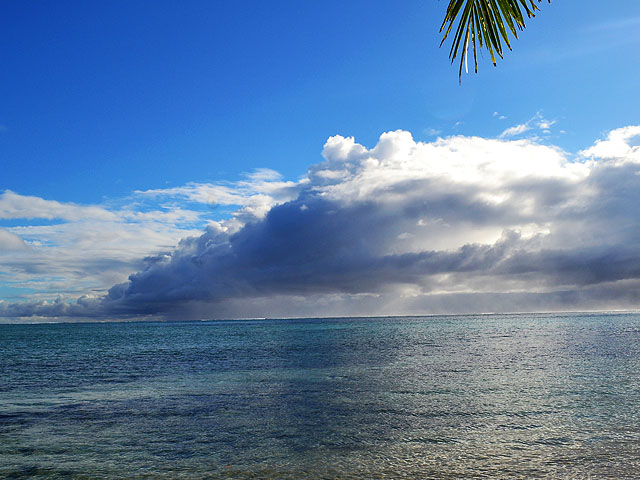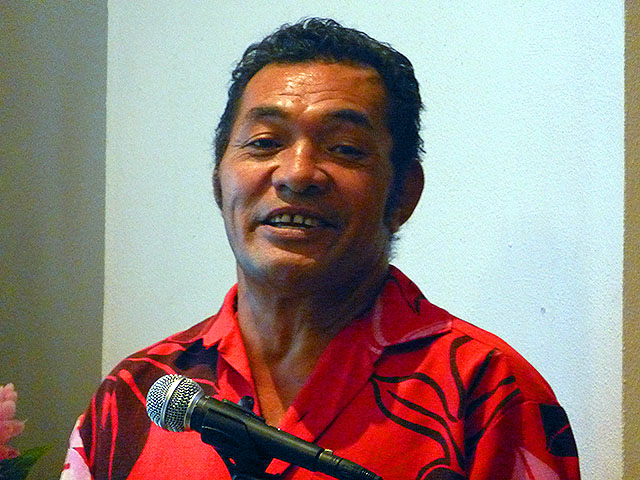
Climate Change Resilience
14 May 2015, Apia, Samoa, PCCR - "The cyclone is located 230kms NW of Samoa, moving SE at a speed of 16 knots".
If this information was broadcast on radio and heard in a Pacific village, would community members understand it enough to react to the threat?
In Lefagaoali'i village, on the island of Savaii in Samoa, the community has recently been trained to better understand and react to threats including tropical cyclones, flooding and storm surges, though the Finland-Pacific (FINPAC) project.

"Our community now understands the weather related information given, for the village to be prepared" said Vaiouga Falani, a village leader from Lefagaoali'i who travelled to the 2015 Pacific Climate Change Roundtable along with Mr. Pagaialii Pagaialii, the village mayor.
The success of the training in Lefagaoali'i was made possible through the support of the Samoa Meteorology Division, Samoa Disaster Management Office and Samoa Red Cross who worked together with staff from SPREP and the International Federation of Red Cross and Red Crescent Society who are implementing the FINPAC project.
FINPAC is a regional initiative that aims to reduce vulnerability of the Pacific Island rural villagers’ livelihoods to the effects of climate change and improved capacity of National Meteorological Services to respond to the growing needs of communities to the effects of climate change.
"A trilateral marriage between the Meteorology Division, the Disaster Management Office and the Red Cross in Samoa allows for communities in Samoa to be assisted to understand weather forecasts and warnings" said Salesa Nihmei, Meteorology & Climate Officer at SPREP.
The Red Cross plays an auxiliary role to the Government of Samoa in the humanitarian field and is mandated to play the advocacy role in the most vulnerable communities, such as Lefagaoali'i. "We are teaching community the three basic units to describe the characteristics of tropical cyclones: distance, speed and direction" said Mr. Leauanae Peni Mulitalo from Samoa Red Cross.
The Samoa Meteorology Division issues warnings for heavy rain, small craft and fishing boat advisories, wind advisories and tropical cyclone warnings. "To reach village communities we disseminate this information through radio, television, newspaper and social media. We also do live interviews, emails, and send SMS text messages" said Mr. Luteru Tauvale of the Samoa Meteorology Division.
The Samoa Disaster Management Office delivers management support during times of need to all 361 villages in Samoa. "The 2009 tsunami underline the vulnerability of many communities in Samoa" said Molly Nielsen from the Samoa Disaster Management Office. "We train village response teams to act before, during and after emergencies".
In addition, the media has an important role. Despite being a small nation, Samoa has 6 radio stations, 5 television stations and 5 newspapers. Local Media Representative Ms. Lagi KeresomaTalamua said - "we need the assistance from government agencies to simplify technical terms, so if we can understand them, then the community can understand them".
These community level interventions in the FINPAC Project provide the opportunity to work with selected communities from participating countries of the project, to raise their awareness and understanding of their vulnerabilities and capacities through a participatory Vulnerability and Capacity Assessment (VCA) and community consultation workshop.

Vaiouga Falani, a Matai from Savaii
"Our village people in Lefagaoali'i are committed to the program" concluded Vaiouga Falani.
The Pacific Climate Change Roundtable is held from 12 – 14 May in Apia, Samoa. The event in its current format has been coordinated by SPREP with guidance from a steering committee.
The PCCR has been made possible with support from the Government of Switzerland, Government of Samoa, Government of Australia, European Union, GIZ, United Nations Development Program (UNDP), Secretariat of the Pacific Community (SPC), Pacific Islands Forum Secretariat (PIFS), University of the South Pacific (USP) and the Pacific Council of Churches (PCC). Additional funding support was provided by the EU-GIZ Adapting to Climate Change and Sustainable Energy (ACSE) Programme, and Climate Analytics through its High Level Support Mechanism (HLSM) project. – #pccr2015
If this information was broadcast on radio and heard in a Pacific village, would community members understand it enough to react to the threat?
In Lefagaoali'i village, on the island of Savaii in Samoa, the community has recently been trained to better understand and react to threats including tropical cyclones, flooding and storm surges, though the Finland-Pacific (FINPAC) project.

"Our community now understands the weather related information given, for the village to be prepared" said Vaiouga Falani, a village leader from Lefagaoali'i who travelled to the 2015 Pacific Climate Change Roundtable along with Mr. Pagaialii Pagaialii, the village mayor.
The success of the training in Lefagaoali'i was made possible through the support of the Samoa Meteorology Division, Samoa Disaster Management Office and Samoa Red Cross who worked together with staff from SPREP and the International Federation of Red Cross and Red Crescent Society who are implementing the FINPAC project.
FINPAC is a regional initiative that aims to reduce vulnerability of the Pacific Island rural villagers’ livelihoods to the effects of climate change and improved capacity of National Meteorological Services to respond to the growing needs of communities to the effects of climate change.
"A trilateral marriage between the Meteorology Division, the Disaster Management Office and the Red Cross in Samoa allows for communities in Samoa to be assisted to understand weather forecasts and warnings" said Salesa Nihmei, Meteorology & Climate Officer at SPREP.
The Red Cross plays an auxiliary role to the Government of Samoa in the humanitarian field and is mandated to play the advocacy role in the most vulnerable communities, such as Lefagaoali'i. "We are teaching community the three basic units to describe the characteristics of tropical cyclones: distance, speed and direction" said Mr. Leauanae Peni Mulitalo from Samoa Red Cross.
The Samoa Meteorology Division issues warnings for heavy rain, small craft and fishing boat advisories, wind advisories and tropical cyclone warnings. "To reach village communities we disseminate this information through radio, television, newspaper and social media. We also do live interviews, emails, and send SMS text messages" said Mr. Luteru Tauvale of the Samoa Meteorology Division.
The Samoa Disaster Management Office delivers management support during times of need to all 361 villages in Samoa. "The 2009 tsunami underline the vulnerability of many communities in Samoa" said Molly Nielsen from the Samoa Disaster Management Office. "We train village response teams to act before, during and after emergencies".
In addition, the media has an important role. Despite being a small nation, Samoa has 6 radio stations, 5 television stations and 5 newspapers. Local Media Representative Ms. Lagi KeresomaTalamua said - "we need the assistance from government agencies to simplify technical terms, so if we can understand them, then the community can understand them".
These community level interventions in the FINPAC Project provide the opportunity to work with selected communities from participating countries of the project, to raise their awareness and understanding of their vulnerabilities and capacities through a participatory Vulnerability and Capacity Assessment (VCA) and community consultation workshop.

Vaiouga Falani, a Matai from Savaii
"Our village people in Lefagaoali'i are committed to the program" concluded Vaiouga Falani.
The Pacific Climate Change Roundtable is held from 12 – 14 May in Apia, Samoa. The event in its current format has been coordinated by SPREP with guidance from a steering committee.
The PCCR has been made possible with support from the Government of Switzerland, Government of Samoa, Government of Australia, European Union, GIZ, United Nations Development Program (UNDP), Secretariat of the Pacific Community (SPC), Pacific Islands Forum Secretariat (PIFS), University of the South Pacific (USP) and the Pacific Council of Churches (PCC). Additional funding support was provided by the EU-GIZ Adapting to Climate Change and Sustainable Energy (ACSE) Programme, and Climate Analytics through its High Level Support Mechanism (HLSM) project. – #pccr2015